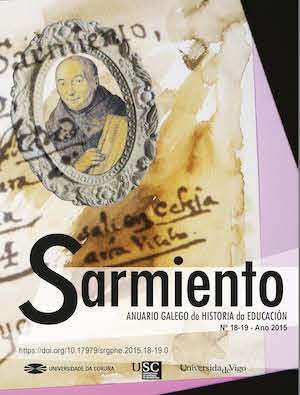Nacemento e evolución da Universidade de Vigo (1989-2014)
Un motor para as tres cidades do sur de Galicia
DOI:
https://doi.org/10.17979/srgphe.2015.18-19.0.4041Palabras clave:
política universitaria, planes de financiamento, mapa de titulacións, profesorado e investigación, servizos á comunidadeResumo
Este traballo é un intento por analizar a breve e recente historia da Universidade de Vigo, (1990-2015), empezando por factores contextuais das décadas anteriores que favorecen o nacemento da institución, para entrar de seguido na evolución da vida universitaria, agrupando os temas en cinco áreas: aspectos organizativos e de goberno democrático da universidade; campus, centros, titulacións, docencia e alumnado; profesorado e investigación; financiamento; Servizos á Comunidade, P.A.S. e extensión universitaria (Cultura, deporte, proxección social, normalización lingüística, servizos a estudantes e comunidade en xeral).
O proceso de democratización consistiu nun alto nivel de participación da comunidade universitaria, tanto no feito de dotarse dunha normativa de funcionamento, como nas decisións de xestión, incluída a elección dos sucesivos órganos unipersoais e colexiados de goberno. Os tres campus que integran a Universidade fóronse configurando coa transformación de centros e titulacións transferidos pola USC, así como coa creación doutros novos, que supuxeron un incremento constante de estudantes nos anos noventa, ata a cifra tope de mais de 30 000 no fin do século, e unha redución de títulos de primeiro e segundo ciclo nos últimos anos, dentro do proceso de aplicación das normas derivadas do EEES, compensado pola creación de novos estudos de posgrao e doutoramento. O número de estudantes tamén se reduciu pois o tamaño dos grupos nestes novos estudos é mais reducido. O cadro de profesorado practicamente triplicouse neste tempo, cun proceso de formación de doutores intenso e non exento de atrancos. Ademais das teses, a produción investigadora e de transferencia, de moitos grupos consolidados é salientable, especialmente en ámbitos da ciencia e da tecnoloxía. Todos estes esforzos nun marco orzamentario que poucas veces supuña unha aposta decidida por crear un Sistema Universitario Público Galego e de Calidade. Situación agravada nos últimos anos no escenario dunha política de recortes, que xera unha situación deficitaria no soporte da docencia e investigación. Ao longo dos 25 anos a Universidade foise dotando de servizos básicos de apoio á docencia, a investigación e á proxección social da universidade, engadindo áreas recentes como a Igualdade ou o Medio Ambiente para completar o cadro de servizos clásicos.


